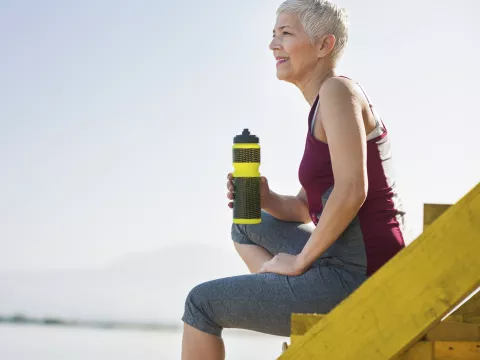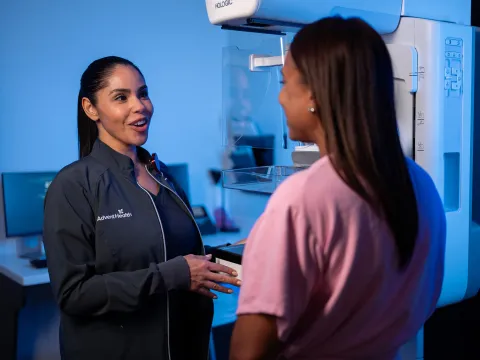- AdventHealth

Exercise is part of everyone's health regimen on the journey to wellness but doing so in the hotter months can lead to serious health consequences that need to be avoided. The following contains tips and tricks for staying healthy and well while exercising in the heat.
Those working toward heart health, especially those over the age of 50 years, and the overweight need to take extra precautions when exercising in warm weather. You should always consult your physician before beginning a new exercise routine.
If you are currently experiencing symptoms, such as chest pain or worsening shortness of breath, or have questions specific to your wellness plan, you should consult with your doctor.
It is also important to note that the effect of certain medications such as those that lower your blood pressure or treat heart failure (ACE inhibitors, Angiotensin receptor blockers, beta blockers, calcium channel blockers, and diuretics) can be exacerbated by the effect of excessive heat. Medications should be kept up with and taken in accordance with the plan prescribed by your physician.
Maintaining Proper Hydration
If you have congestive heart failure and are on a very strict allowance of water, you should avoid exercise in the hottest times of the day as you are susceptible to heat exhaustion and heat stroke, as well as dehydration. If you're on the path to recovering from heart failure, you should try exercising in the mornings, in the evenings or in an air-conditioned gym or mall.
If you're over 50, you're also susceptible to dehydration as you may have a diminished awareness of thirst. It is recommended that you drink plenty of fluids before, during, and after exercising.
If you're overweight, you are also susceptible to heat exhaustion and heat stroke and should be certain to maintain proper hydration as well as taking breaks where needed.
Everyone exercising in high temperatures should follow the following basic guidelines:
- Dress appropriately Start with applying a water-based SPF 15 or higher sunscreen to all areas of the body that may be exposed to the sun. Choose lightweight, light-colored, and well-ventilated clothing and shoes. New synthetic fabrics that repel moisture or wick it away are highly recommended but if unavailable cottons and linens are sufficient.
- Maintain proper hydration Unless you have specific requirements as mentioned above, it is recommended that you drink a few cups of water before, during, and after exercise. Caffeinated and alcoholic beverages are to be avoided as they promote dehydration.
- Know when to say, When - Be sure not to push yourself too hard and to take regular breaks when exercising in the heat. Over-exertion can quickly lead to heat exhaustion or heat stroke. Find some shade, have a drink of water, take a breath, and start again.
- Keep at it Exercise during the hottest months can be daunting, uncomfortable, and even dangerous without the right precautions. However, when performed safely, the benefits to your health outweigh the inconveniences.
Symptoms of Heat Exhaustion and Heat Stroke
If you experience the following symptoms you should immediately move to a cooler place, stop exercising, and cool down by using cool water poured over the head, ears, neck and wrists or use wet cloths, compresses, and fanning. If symptoms persist, seek medical attention.
Watch for:
- Cool, moist skin
- Dark urine
- Dizziness and/or lightheadedness
- Headaches
- Nausea and vomiting
- Weakness
If symptoms worsen to the following, seek medical attention immediately by calling 911.
- Dry, hot, and red skin
- Extreme confusion
- Fever (temperature above 104 F)
- Irrational behavior
- Rapid, shallow breathing
- Rapid, weak pulse
- Seizures
- Unconsciousness
Next Steps
With these precautions in mind, your journey to overall health and well-being, physically, mentally, and spiritually is just outside your front door. Just be sure to dress appropriately, hydrate sufficiently, take breaks when needed, then keep going, and watch for any signs of trouble.
To learn more about what precautions you should take on your journey to best health or to make an appointment with a specialist to discuss your specific needs and goals, please visit your primary care physician or health coach. If you suffer from chronic, advanced heart or lung conditions, please consult with your cardiologist or pulmonologist. Click here to learn more about our Heart, Lung, and Vascular Institute in West Florida.




